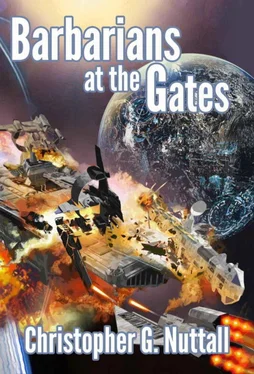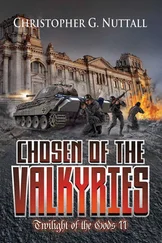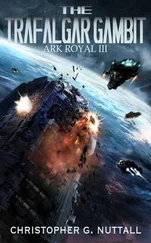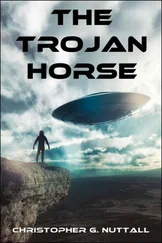He padded down the long corridor, shaking his head. Very few people on Earth, outside of people attending universities and of course the historians, knew there had once been nations called America or China. These days, when people thought of Americans, they thought of the American-ethnic planets that were part of the Core Worlds.
The Blue Room had been designed for conferences and was outfitted with the most sophisticated counter-surveillance tools known to the Federation. It was comfortable, rather than formal, with a small drinks dispenser and adjustable chairs, along with a processor that could connect to every database on Earth. Rupert took his seat and settled back, waiting for his household staff to escort the guests into the room. Their allies—the supporters and aides they’d brought to the meeting—would be placed elsewhere. The real meeting would take place here.
He stood up as Grand Senator The Honorable Carlton Brockington, Leader of the Conservative Faction, was escorted into the room. Brockington looked tired and worn. The shock of hearing about the defeat at Jefferson, much less the later battle at Boskone, had taken a toll on the Conservative Faction. Allegiances were being redrawn under the table, suggesting that Brockington might find himself replaced if the war continued to go badly. Grand Senator Alison Wallisch, Leader of the Socialist Faction, looked altogether more confident. She cast a nasty look at Rupert as she entered, reminding him that she—at least—hadn’t forgotten how the Socialist Faction had been pushed into supporting the Blue Star War. The prospect of yet another alien race to civilize had proved too tempting to resist.
“Thank you for coming,” Rupert said once the doors had closed. He had no doubts about the loyalty of his household staff, but the other two would be aware that his staff worked for him . “It is my pleasure to allow you to use my humble home for your talks.”
Brockington scowled at him. He knew when he was being mocked.
The shifting political scene might not resurrect the Imperialist Faction, but Rupert controlled a handful of votes. They could be decisive if the two main factions fell out. Perversely, despite being the weakest of the three, Rupert knew that he was in the strongest position. He might not be able to win on his own, but he could determine who won—or lost.
“We need to consider the current situation,” Brockington said after a long pause. “Parkinson failed us. The grand march to victory he promised turned into a disaster. The media…has been tearing away at our failure to secure the victory we guaranteed.”
Rupert concealed a smile. The Senators controlled around a third of Earth’s media, but the system of checks and balances the original writers of the Federation Constitution had worked into the system prevented them from controlling all of it. And that didn’t include the independent media outlets off-planet; the Core Worlds would resist any attempt to slap controls on their media, threatening the position of their elected representatives. The net result, now that Admiral Justinian hadn’t been squashed flat, had been the media turning on the Senate. Someone in whatever was left of Navy HQ had leaked the records of the battle and retired admirals had been happy to comment on Parkinson’s many failings as a tactician, feeding the panic. Earth’s citizens hadn’t had to feel fear since the First Interstellar War. Now, after the attack on Earth itself, they were fearful and turning on the Senate.
“They’ve actually been demanding that we put Admiral Drake in charge,” Alison said. “For all I know, he’s the one who might have leaked the recordings to the media.”
“I very much doubt it,” Rupert pointed out mildly. “Admiral Drake has ordered the media out of the Boskone System, citing concerns about revealing too much information to the enemy.”
“A clear abuse of his authority,” Alison snapped.
Rupert thought about pointing out the hypocrisy in that statement—the Socialist Faction wanted to control the media completely, believing that the less the public knew, the happier they’d be—but declined the opportunity to score a point. Instead, he focused on the issue at hand.
“Admiral Drake has also given us a victory—both victories,” he said. “And then he managed to extract most of the Retribution Force from Jefferson after it was ambushed. I submit to you that we cannot afford to lose him. We have to use him.”
Alison snorted.
“And what happens if he turns his coat and goes over to Justinian, or sets up on his own? We are talking about giving him enough firepower to wreck several planets…”
“More like entire star clusters,” Rupert said. “A single destroyer could wreck a planet or two if they weren’t defended.”
“The fact remains that he could turn on us,” Brockington said. “He may be from Mars, but his family is not well-connected. They are certainly not connected to the Senate.”
“We could find him a wife,” Alison said slowly. “There are quite a few possible candidates for a marriage which would tie him to us by blood. There isn’t even any reason why it has to be immediate. We could hold out the promise to him and delay things until Justinian is defeated—and then cancel the arrangements, if necessary.”
“I have asked my researchers to draw up an extensive psychological file on Admiral Drake,” Rupert said with a smile. He’d also spoken to Professor Kratman and some of his other allies, although that wasn’t something he was about to mention in this company. “Their conclusions were quite encouraging.”
He had their undivided attention.
“Marius Drake is a believer in the Federation; in duty, honor, loyalty…all the military virtues,” Rupert continued. “His desperation to convince us to release additional units to the Rim didn’t come from an urge to challenge us, or to encourage his own relief, but from a determination to protect the colonies from pirates and Outsiders. Drake may not be loyal to any of us, not personally, but he is loyal to the Federation—and we are the embodiment of the Federation. I believe we can count on him.
“He could have gone rogue along the Rim, or joined Admiral Justinian, or even led his ruined fleet to a different sector and set up as an independent warlord,” he pointed out when they looked unconvinced. “Instead, he chose to make his stand and hold Admiral Justinian. That is not the record of a traitor, but of a very loyal man.”
“We can use him,” Alison agreed.
“The fact remains,” Brockington growled, “that he isn’t one of us. Even if we arrange him a marriage to one of our daughters, he won’t be part of High Society.”
“We could always put in another formal commander and inform him that he is to consider himself subordinate to Admiral Drake, whatever the chain of command might say,” Alison said thoughtfully. “That would save us having to acknowledge that we owe him, at least publicly.”
“I’m afraid that won’t work.” Rupert shook his head. “In fact, it would be asking for trouble.”
“And why would that be the case?” Alison rounded on him.
“Let’s face facts, shall we?” Rupert asked. “The bonds of loyalty that held the Federation Navy together are snapping. Admiral Justinian was merely the first to attempt to seize supreme power for himself. There are at least a dozen other admirals—or Sector Governors—who might launch their own bids for power. They’re currently sitting on the fence, waiting to see what we do.
“Now tell me: how do you think they’d react when we keep replacing the one man who has bought us victories?” He smiled at their disgusted expressions. “We will be telling them that whatever grounds we use for promoting people, they don’t include either loyalty or competence. The ones who don’t have serious political connections will be wondering if they will be made to carry the can for failures or disasters caused by other people. The ones who are ambitious will start thinking how they can accomplish their aims without us, if we don’t help them. We have to send them a message—and that message has to be that we will reward loyalty, and success. Or we may as well decide that we’re going to lose most of the Federation.”
Читать дальше












